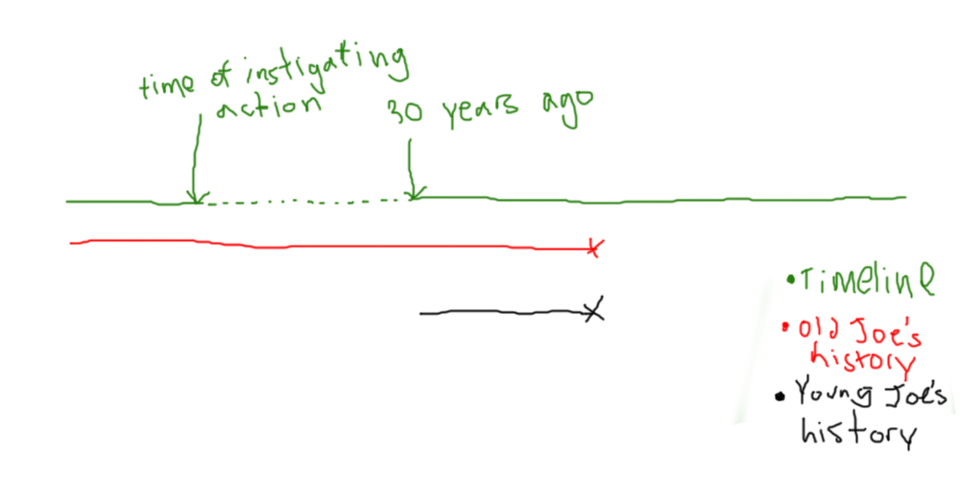@TheHT said:
@FlarePhoenix said:
Alright, let's see if I can explain this a little clearer. From what I understand, we're in agreement there is only one timeline in this universe, and any changes made in the timeline will affect it from that point on. We see this in the movie when Old Joe is sent back and killed immediately, Young Joe grows up, gets married and cleans up his act (he becomes Old Joe who we follow in the movie). However, because, this time, Old Joe managed to escape before getting killed, it drastically changed how Young Joe's life turned out (he meets Sara and Cid, and ultimately kills himself). So I believe we can agree, someone who gets sent back in time can have a drastic impact and alter the timeline (since that's exactly what happens in the movie). Joe getting sent back in time may not be forward progress in it of itself, but any actions he takes in the past definitely are.
Now, because Joe's loop has been closed, his life is now stuck in an infinite loop: he will kill his future self, and then grow up to that point where he is sent back in time to be killed by his past self. The process will repeat again and again. However, Young Joe changed that: he killed himself before he was sent back, breaking the loop. My problem is, that event happens entirely because Old Joe was sent back in time. If Old Joe wasn't sent back in time, Young Joe never would have met Cid or Sara, and wouldn't have been in a position where he needed to kill himself. Because Joe no longer exists to grow old and get sent back in time, it means all the events that happened because he was sent back in time won't happen, including Joe killing himself.
His life isn't stuck in an infinite loop, but yes, the existence of the loop is from human design. 'Closing the loop' is just getting to the point at the end of your contract where you kill your future self, self-entering and self-maintaining the loop. If Young Joe fails to kill Old Joe, the loop fails to exist. If Old Joe doesn't come back, the loop fails to exist. But the 'loop' itself they are referring to is strictly regarding the contract they've agreed to.
Here comes the disconnect between us. After Old Joe is sent back in time, Young Joe killing himself does not undue everything that Old Joe has done after Old Joe came back. Old Joe's history (the future that he leaves behind) will not become reality after that point. Young Joe will not grow old and be sent back, but that doesn't retroactively undue what Old Joe has done after he came back.
Imagine all humans came from one human, and you were to travel back to its time and kill that one human. You would completely change the future, but as a piece of that future your existence is incumbent upon the things that happen in your perceived present (which would be your historical past). So when that first human dies, you *instantly* cease to exist. When the timeline reaches the point where you would have gone back, it simply moves onward without any regard for your existence. The timeline is, from the point of the first human dying, completely changed. And your existence on that changed timeline is only as an isolated entity that, during its presence on the changed timeline, came literally from nowhere and disappeared once you killed the first human.
@FlarePhoenix said:
As I said, we know altering the past changes the future, and the movie shows us someone getting sent back in time can heavily alter the timeline. Think about Joe getting sent back in time as a moment in the timeline. When Old Joe gets sent back to that moment, but is immediately killed, his younger self grows up, and gets married. When Old Joe gets sent back to that moment, but escapes, his younger self chases him, meets Cid and Sara, and ultimately kills himself. There are two divergent paths based on what happens after Joe gets sent back (whether he escapes or is immediately killed). However, because Joe is now dead, we're currently in a timeline where Joe won't get sent back to that moment at all.
This means Joe won't have to chase his future self, he won't meet Cid and Sara, and he won't kill himself to stop his future self (because his future self won't be around to be stopped). Since those events won't happen, he'll probably stay a drug-dealing murderer with mother issues (unless something else happens to change his life, but that's besides the point).
No, what it means is that the timeline will continue for thirty years plus. Just without Joe and also unlike the former (now hypothetical and known only to the viewer) path of the timeline. The only way what you're saying would truly be a problem is if the events of the movie were constantly repeating with each Old Joe time travelling back to another instance of the timeline, the result being that the next instance of the timeline after Young Joe kills himself would not have an Old Joe to go to and change things, meaning that that timeline would end up the same. But such a scenario is more exemplary of circular time, and is not a straight and singular forward-moving timeline.
If this makes more sense to you, you could consider that the former path of the timeline still exists, but just as another section of the timeline as the second diagram shows. Thus when Young Joe killed himself, there would be no paradox because the instigating action in question (Old Joe coming back) already happened during the former section of the timeline I've referred to as the 'former path' of the timeline. That is of course if you find my explanation where the future simply ceases to exist difficult to accept but don't mind having to account for potential time gaps or moments of regression to facilitate the act of time travel itself.
I find my first explanation (and associated diagram) to be simpler and more sensical, but either way seems to explain time and time travel alongside the events of the movie.
The movie quite clearly demonstrates that what happens after Joe gets sent back in time has a huge impact of the events of his life. The events of Joe's life were set to repeat themselves before Joe killed himself. He would grow up, get sent back in time, be killed by his younger self, and his younger self would grow up to have the same thing happen to him. The only reason that cycle was broken was because Old Joe managed to escape and change the timeline. However, he changed it in such a way that caused his existence to be erased.
Because Joe killed himself before he got sent back, and because him killing himself relies on him getting sent back, it means he couldn't have killed himself. He needs to be alive at the point where gets sent back in time to set up the events that happen in the movie. It is simply not possible if he kills himself before he gets sent back. Him killing himself is a direct result of him getting sent back from the future. The only way what you're saying makes any sense is if you start going into multiple timelines.
Timeline 1: Joe grows up, gets sent back, and killed by his younger self. The future of this timeline would continue on, but Young Joe would now be a part of Timeline 2.
Timeline 2: Because Young Joe now knows he has thirty years to live, he makes drastic changes to his life. He meets a woman, she helps him clean up his act, they get married, she gets killed and he, fuelled by revenge, manages to escape his captors and sets up the events of the movie. However, this also causes Joe to kill himself, so it would set up a third timeline.
Timeline 3: Because Joe no longer exists, it means he is never sent back in time, meaning the events of the movie never took place. Because Young Joe never meets his older counterpart, his life will probably turn out like the first Joe's.
but as you've quite adamantly stated: there is only one timeline, which means each timeline is erasing the previous one instead of creating an offshoot. Events don't just happen in a vacuum: you can't change one event, and expect everything else to still happen the exact same way. If you change Joe getting sent back in time, it changes every event that occurred because he was sent back in time. The events in the movie are constantly repeating themselves. If they weren't, people wouldn't be able to travel back in time. You would have a situation like the Langoliers where the past was constantly getting erased, but that is not the case. We quite clearly see the events of Joe's life play out multiple times in different ways.
We quite clearly see how the timeline is altered because of what happens to Old Joe after he is sent back in time, so you can't say the timeline cannot be altered. Otherwise the entire movie becomes completely pointless. We very clearly see the events that occur in the timeline determines how the timeline turns out, but the lack of a certain event can be just as important as the event itself. Joe being dead before he gets sent back means everything that happened because he was sent back no longer happens. You cannot say "well it already happened, so that means it doesn't matter" because that would mean the entire movie couldn't have happened. If everything that happens is set in stone, as you're saying, it means Old Joe couldn't have alluded his captors and get sent back untied, because he already failed to do so once.
If Old Joe can change the timeline by escaping, it means Young Joe can change the timeline by killing himself. Part of that change involves him never getting sent back in time, and therefore the events that occur because he was sent back in time, including killing himself, never happen.


Log in to comment